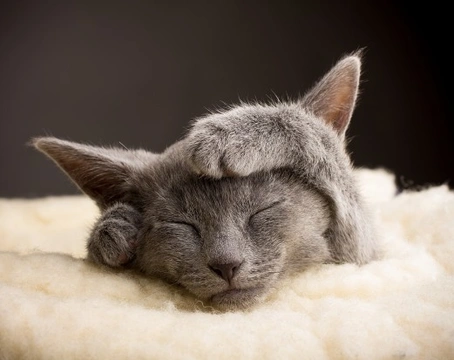
Inappropriate purring in cats
Purring is usually associated with happy, contented cats, and is one of the most pleasant and soothing sounds for both cats and cat lovers to hear. However, sometimes cats will purr at odd moments too; when they are sick, injured or stressed, and clearly not happy and contented. This is known as “inappropriate purring” and can indicate that something is amiss with your cat. It often confuses cat owners to find their cats purring in unusual situations; for instance, while they are out of their comfort zone and being examined by a vet. In situations such as these it is usually clear whether or not the cat is purring happily or due to stress, but at other times, it can be more difficult to define.
Read on to learn more about inappropriate purring in cats, and how you can learn to tell the difference between a happy purr and purring for other reasons.
What is purring?
Purring is a noise produced by air passing over the vocal folds of the larynx, causing vibration of the air upon inhalation and exhalation. Every cat has their own unique purring sound, and cats will purr in many different situations and for many different reasons, often varying the tone and intensity of their purring accordingly. There are a multitude of normal reasons for why cats purr; it can be used to communicate with other cats and people, to signal comfort and happiness, or as part of settling down and going to sleep. The purring sound itself is soothing, both to the cat doing the purring and other cats around them.
Inappropriate purring
The soothing aspect of purring partially explains the existence of inappropriate purring, and cats that are stressed, sick or otherwise unhappy may purr to soothe themselves, which explains purring in inappropriate situations. Purring also goes some way towards blocking out outside sounds and stimulus for the purring cat, who hears their own purring as a vibration through their bodies as well as aurally, and so cats may also purr to help to subdue the sounds of outside stimulus, such as fireworks or other loud noises.
Female cats will also sometimes purr while giving birth to a litter, which can help to both ease the birth and keep the kittens and mother cat calm.
How to tell if your cat is inappropriately purring
If your cat is sick, feels insecure, has hurt themselves or is being stressed by external factors, the sound of them purring can come as a surprise to their owners. In these situations, the owner should consider whether it is likely that the purring is a genuine happy purr, or being used to self-soothe in the face of worry or stress. Cats purr frequently, several times a day, and inappropriate purring is relatively uncommon, and only performed at times of worry or stress.
So unless you feel that your cat is unwell or that there is something else amiss that has changed their usual day to day lives, it is unlikely that your cat will be inappropriate purring rather than purring normally on a daily basis. Cats that are inappropriately purring will not usually appear relaxed and comfortable like cats purring normally, and may be sitting hunched up, appear uncomfortable, or be attempting to hide or make themselves appear smaller than usual.
Identifying the cause of inappropriate purring
Once you have ascertained that your cat is inappropriately purring, it is important to identify the cause of the issue that is leading to this and address it. In transient situations, the issue will of course correct itself once the cause of stress has passed; for instance, if it is caused by fireworks or a visit to the vet. While being examined on the table at the vets is one of the most common situations in which to witness inappropriate purring, you should not automatically assume that if your cat purrs at the vets, they are unhappy! If your cat is laid back enough to not mind the trip to a new place and is enjoying the attention, it is entirely possible that they may simply be purring normally!
Most importantly, inappropriate purring can let you know that something that you are unaware of is stressing your cat out at home, or that they have injured themselves somewhere that you cannot see, or that they are sick. Cats are very good at masking signs of illness or injury to avoid appearing vulnerable to predators, and so identifying inappropriate purring can serve as an important early warning signal that your cat is not in perfect health.
If you can rule out household stress- for instance, changes within the home, a new pet, or another cat that your cat runs into outside of the home bullying them, then it is important to look at the bigger picture. Consider if there are any other signs or symptoms that your cat might be under the weather, such as loss of condition, sickness or diarrhoea, or changes to their toileting routine. If you cannot get to the bottom of the issue or if you have any suspicions about your cat’s health, it is important to take them along to the vets for a check up, just to be on the safe side!



